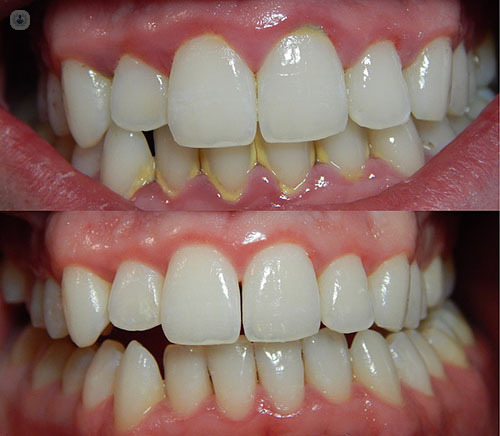

What is gingivitis?
Gingivitis is a periodontal disease, which affects the tissues that support the teeth such as gums, periodontal ligaments and the alveolar bone. The most common form of gingivitis is also the most common type of periodontal disease, caused by plaque on the teeth.

What are the symptoms of gingivitis?
The symptoms of gingivitis are the following:
- Gums being inflamed and red or purple, instead of their usual pink colour.
- The gums bleeding during or after being brushed.
- The gums hurt when touched, though they are not painful otherwise.
- The appearance of sores.
How does it occur?
Gingivitis is caused by the build-up of plaque on the teeth. Plaque build-up is composed of food residues, mucus and bacteria that accumulates on the teeth and, if not properly cleaned, it becomes tartar. Tartar takes a hard consistency and is trapped at the base of the teeth, meaning the bacteria that make up the plaque cause inflammation of the gums through proximity.
Can gingivitis be prevented?
Gingivitis can be prevented by good dental hygiene, such as brushing your teeth three times a day and flossing – follow your dentist’s recommendations for the best dental hygiene routine. The use of dental floss is very important to remove plaque and food residues that remain between the teeth, and floss should be used especially before bedtime.
A regular dental cleaning at the dentist’s office is also recommended, which thoroughly removes all tartar.
What is the treatment of gingivitis?
The main objective in the treatment of gingivitis is to reduce the inflammation. To remove the build-up of tartar, the dentist will perform a professional dental cleaning. After this, you will have to follow good hygiene practice, making sure to brush and floss.
Your dentist will also be able to recommend suitable mouthwashes or other types of dental cleaning products which can help with the condition.
